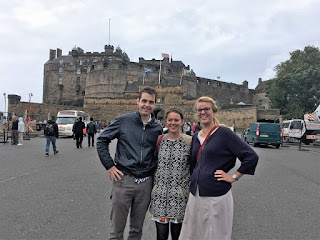“Let us step into the night and pursue that flighty temptress, adventure.”
― Albus Dumbledore, Harry Potter and the Half-Blood Prince
It has come to my attention that some people, upon seeing my photos, doubt that I am living in a real city, rather suspecting that I have entered some painted park or, like Alice, slipped through a window to a fantastic wonderland.
This post makes no attempt to disabuse them of that notion.
The beautiful city of *Edinburgh is where J.K. Rowling was living, working as a single mother, when she pinned "Harry Potter and the Sorcerer's Stone" in a cafe called the Elephant House.


...which also makes a delicious marshmallow hot chocolate.

It's easy to identify places where she would have found inspiration. Just across the street from the Elephant House cafe is a cemetery where, rumor has it, names like "Tom Riddle" and "McGonagall" can be found.


Edinburgh also has an alleyway, a stone's throw from the School of Divinity at New College, that bears alarming resemblance to Knockturn Alley.

The discerning Potter fan might also experience castles for all occasions...
The beautiful city of *Edinburgh is where J.K. Rowling was living, working as a single mother, when she pinned "Harry Potter and the Sorcerer's Stone" in a cafe called the Elephant House.


...which also makes a delicious marshmallow hot chocolate.

It's easy to identify places where she would have found inspiration. Just across the street from the Elephant House cafe is a cemetery where, rumor has it, names like "Tom Riddle" and "McGonagall" can be found.


Edinburgh also has an alleyway, a stone's throw from the School of Divinity at New College, that bears alarming resemblance to Knockturn Alley.

The discerning Potter fan might also experience castles for all occasions...

...suits of armor

...OWLS

broomsticks...

...and song.
Many in Edinburgh make wild claims about how Scotland inspired Madam Rowling's creative wizarding world. Surely this gothic, picturesque place, they say, needs a very few literary embellishments to be transfigured into a full-scale land of enchantment.
And I agree with them.
* One of my Scottish friends bids me inform you that Edinburgh is quite different from the rest of Scotland. I don't know what he means by it. But that's my only disclosure!






